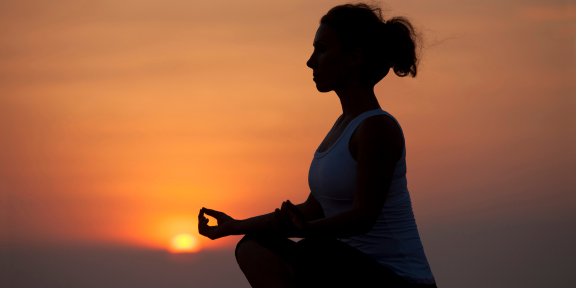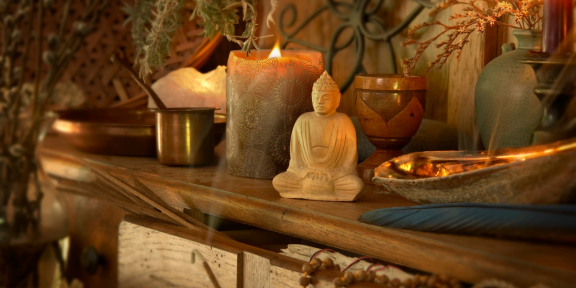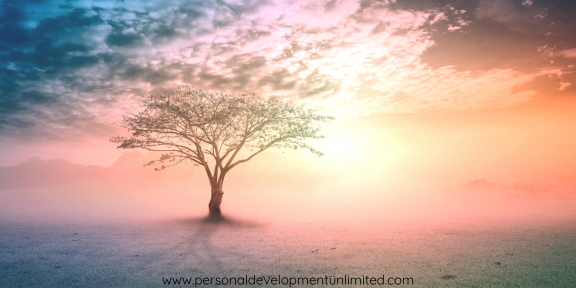Are you feeling disconnected from yourself and your purpose in life? Are you searching for a way to grow and develop as a person? Perhaps it’s time to explore spirituality as a means of personal development. In this article, we’ll delve into the connection between spirituality and personal growth, the benefits of incorporating spirituality in your journey, and how to integrate spiritual experience into your life.
Defining Spirituality
There is no one right way to define spirituality. Spirituality is a broad concept that can mean different things to different people. At its core, spirituality is about connecting to something greater than oneself, whether that be a higher power, a sense of purpose, or the universe as a whole. Spirituality can involve practices such as prayer, meditation, and mindfulness, as well as beliefs about the nature of existence and the purpose of life.
While spirituality is often associated with religion, and religious traditions, it’s important to note that spirituality can exist independently of any particular religious tradition or belief system. Many people find spirituality through practices such as yoga, meditation, or spending time in nature. Ultimately, spirituality is about finding meaning and purpose in life, and it can take many different forms.
Often the basic premise of a spiritual life is asking the question, “Am I a good person?”.
Questions a person may ask when exploring religion and spirituality, and being a good person are:
- Am I a good person?
- What is the meaning of my suffering?
- What is my connection to the world around me?
- Do things happen for a reason?
- How can I live my life in the best way possible?

The Role of Spirituality in Personal Development
So how does spirituality relate to personal development? At its core, personal development is about becoming the best version of yourself and living a fulfilling life. Spirituality can play a key role in this process, as it provides a framework for understanding yourself and your place in the world.
When we connect with something greater than ourselves, whether that be a higher power or a sense of purpose, we gain perspective on our own lives. We can see our problems and challenges in a broader context, a spiritual dimension, and we can draw on the strength and wisdom of something greater to help us overcome them. Spirituality can also provide a sense of inner peace and calm, which can be invaluable in navigating the ups and downs of life.
The Benefits of Incorporating Spirituality in Personal Growth
Incorporating spirituality into your personal growth journey can have a range of benefits. For one, spirituality can provide a sense of purpose, direction and positive emotions. When we have a connection to something greater than ourselves, we have a reason to keep moving forward and striving for growth.
Spirituality can also help us tap into our intuition and inner wisdom. When we quiet our minds through practices like meditation or prayer, we become more attuned to our very own experiences and inner guidance. This can help us make better decisions, navigate challenges with more ease, and stay true to our values and goals.
In addition, spirituality can provide a sense of community and connection. Many spiritual practices involve gathering with like-minded individuals, whether that be at a church, temple, or meditation center. This sense of community and faith can be incredibly powerful, as it allows us to connect with others who share our values and beliefs.

Different Spiritual Practices and Their Impact on Personal Development
There are many different spiritual practices that can impact personal development. Here are just a few examples:
- Meditation: Meditation is a practice of quieting the mind and focusing on the present moment. Regular meditation practice can help improve focus, reduce stress, and increase feelings of calm and inner peace.
- Yoga: Yoga is a physical and spiritual practice that combines movement with breath and mindfulness. Practicing yoga can help improve physical health, reduce stress and anxiety, and promote a sense of inner peace.
- Prayer: Prayer is a form of communication with a higher power, and can take many different forms depending on one’s beliefs. Regular prayer practice can help cultivate a sense of connection to something greater than oneself, and can provide comfort and guidance in difficult times.
- Nature walks: Spending time in nature is a spiritual practice for many people, and can provide a sense of connection to the natural world. Regular nature walks can help reduce stress, improve mood, and promote feelings of calm and inner peace.
- Gratitude practice: Cultivating a sense of gratitude can be a powerful spiritual practice that can help you shift your focus from what you don’t have to what you do have. You can start a gratitude practice by writing down three things you’re grateful for every day, expressing gratitude to others, or simply taking a moment to reflect on the good things in your life.
- Service to others: Engaging in acts of service to others can be a powerful spiritual practice that can help you feel more connected to your community and increase feelings of happiness and well-being. Volunteering at a local charity, helping a friend in need, or simply showing kindness to others can all be ways to engage in service to others.
How to Integrate Spirituality in Your Personal Development Journey
If you’re interested in integrating spirituality into your personal development journey, there are a few things you can do. Here are some steps to get started:
- Explore different spiritual practices: Take some time to explore different spiritual practices and see what resonates with you. Try attending a yoga class, visiting a meditation center, or reading books about different spiritual traditions.
- Make time for spiritual practices: Once you’ve found a spiritual practice that resonates with you, make time for it in your daily life. This could mean setting aside time each morning for meditation, attending a weekly yoga class, or taking regular nature walks.
- Find a community: If you’re interested in connecting with others who share your spiritual beliefs, try attending events or gatherings at a local church, temple, or meditation center. You could also consider joining an online community of like-minded individuals.

Challenges in Combining Spirituality and Personal Development
While incorporating spirituality into your personal development journey can have many benefits, there may also be challenges along the way. Here are a few common challenges to keep in mind:
- Time constraints: Finding time for spiritual practices can be challenging, especially if you have a busy schedule. It can be helpful to start small and build up gradually over time.
- Finding the right practice: Not all spiritual practices will resonate with everyone. It may take some trial and error to find a practice that feels right for you.
- Staying committed: Like any habit, it can be challenging to stay committed to a spiritual practice over time. It can be helpful to find an accountability partner or community to help keep you on track.
Tips for Maintaining Your Own Spirituality for Personal Growth
If you’re committed to incorporating spirituality into your personal development journey, here are some tips to help you stay on track:
- Make it a habit: Consistency is key when it comes to spiritual practices. Try to make your spiritual practice a daily habit, even if it’s just for a few minutes each day.
- Be patient: Spiritual growth takes time and patience. Don’t expect instant results, and be gentle with yourself as you navigate the ups and downs of your journey.
- Stay curious: Keep an open mind and stay curious about different spiritual practices. There’s always more to learn and explore.
Examples of Individuals Who Have Successfully Combined Spirituality and Personal Development
There are many examples of individuals who have successfully combined spirituality and personal development. Here are just a few:
- Oprah Winfrey: Oprah has long been open about her spiritual beliefs and the role that spirituality plays in her life. She has credited her spiritual practice with helping her overcome challenges and stay focused on her goals.
- Deepak Chopra: Deepak is a well-known spiritual teacher and author who has written extensively about the connection between spirituality and personal growth. He has developed a range of spiritual practices and tools to help individuals on their personal development journeys.
- Eckhart Tolle: Eckhart is a spiritual teacher and author who has written extensively about mindfulness and living in the present moment. His teachings have helped many individuals connect with their inner wisdom and find greater peace and fulfillment in life.

The Benefits of a Spiritual Life
While no direct causal link has been established, research has consistently found that spiritual involvement is correlated with better physical and emotional health and mental health, including better sleep, lower blood pressure, and an overall lower rate of mortality. Higher levels of spirituality have also been linked to increased compassion, strengthened relationships, and improved self-esteem.
In fact, studies suggest that even those who don’t consider themselves religious or spiritual may still benefit from engaging in practices like meditation or spending time in nature. One study for example found that practicing meditation for just eight weeks can lead to measurable changes in the brain, including increased activity in areas associated with emotional regulation and decreased activity in areas associated with stress and anxiety.
The Search for Meaning
An instinct toward spirituality appears to be deeply ingrained in humans. We can’t help but ask big questions: What is the meaning of life? Is there a divine purpose to our existence? Research finds that even declared religious skeptics can’t stifle a sense that there is something greater than the physical world they see.
As the brain processes sensory experiences, it naturally looks for patterns—and our conscious selves often seek meaning in those patterns. This can lead to the phenomenon known as “cognitive dissonance,” which describes how, once one believes in something, one is strongly inclined to try to explain away anything that conflicts with it. Cognitive dissonance is not unique to religion or spirituality, but often occurs in the context of such beliefs.

FAQs
Q: Is Religion Good for You?
A: While the benefits of spirituality are widely recognized, some may question whether religion itself is good for you. Overall, a large body of research suggests that religious attachment is generally beneficial for people. It is correlated with better health habits such as less smoking and drinking, an enhanced ability to cope with stress, and increased social support. Research also finds some downsides, however, such as increased levels of guilt and shame in stricter religious communities.
It’s important to note that spirituality and religion are not the same things. Religion often involves specific beliefs and practices that may not resonate with everyone. However, the overarching theme of connecting to something larger than oneself can still be present in every aspect of one’s spiritual journey.
Q: How can I find meaning in life?
A: The secret to finding meaning in life may be not to look for it. Psychiatrist Victor Frankl, a Holocaust survivor, famously wrote about how he held onto meaning and purpose as a counter to suffering and death. However, he advised against actively searching for meaning, instead suggesting that meaning should ensue as a side effect of pursuing other goals. Research supports this idea: Those who report actively seeking meaning in life also report lower life satisfaction and happiness.
Q: Why do people believe in God?
A: While many believers insist God’s existence is self-evident, evolutionary psychologists have researched why humans may have begun believing in a higher power. It’s possible that when humans mastered tools, gaining a sense of their own agency, they applied that thinking to the world around them, and the gods who must have created it. This is known as animistic belief. As human communities grew, a belief in gods who could punish wrongdoers or support agriculture also took hold, an idea that still holds great power in religions today.
Q: Do Spiritual Experiences Affect the Brain?
A: Spiritual experiences, such as meditation or prayer, have been found to activate certain regions of the brain associated with emotion, self-referential processing, and attention. Studies have also shown that long-term meditation can lead to structural changes in the brain, such as an increase in gray matter volume in regions associated with attention and emotional regulation. These changes may help explain the cognitive and emotional benefits of meditation and other spiritual practices.
Q: What are other areas of personal development that are beneficial to include in your exploring spirituality plan:
Emotional Well-being – the ability to recognize yours and others emotions.
Intellectual/Mental health – your mental commitment and strength.
(Here at Personal Development Unlimited we categorize Emotional and Intellectual together in a general personal growth category for ease of use as they often overlap and merge.)
Physical Health – make sure you are getting enough sleep, eating healthy, being active and getting any medical care you need.
Financial Management – learn the best strategy to manage your money and use it in the best ways for you to achieve your goals and live the life you want.
Relationship/Social Growth – have the best relationships you can with romantic partners, family and friends.
Career Development – design the career of your dreams from climbing the ladder to owning your own business.
Conclusion: Embracing Spirituality for Personal Development
Incorporating spirituality into your personal development journey can be a powerful way to connect with something greater than yourself, tap into your inner wisdom, and find greater peace and fulfillment in life. Whether you choose to explore meditation, yoga, prayer, or another spiritual practice, there are many different paths to spiritual growth.
By staying curious, making time for spiritual practices, and staying committed to your journey, you can unlock and discover the many benefits of spirituality for personal development. So why not start exploring today? You never know where your spiritual journey might take you.
Personal Development Unlimited is your go-to place to be You, Without Limits. We bring together personal development and self-improvement articles, books, courses and videos in one place. Find your self-growth opportunities easily.
Comments
0 comments



